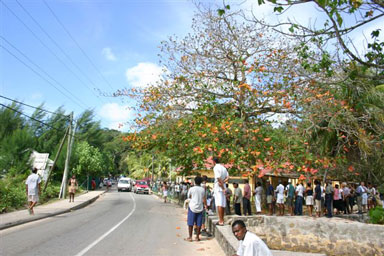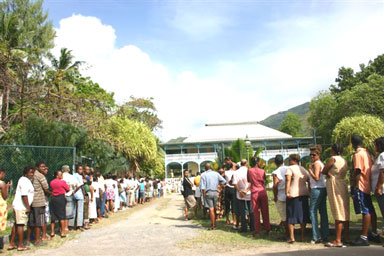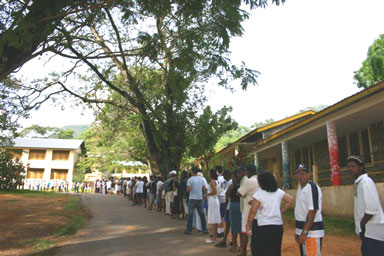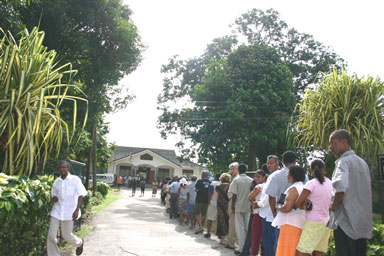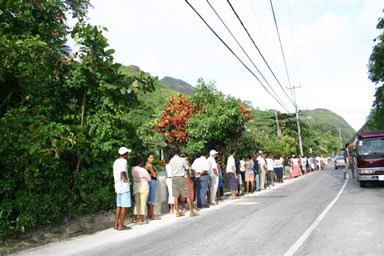

THE FORMIDABLE POLITICAL MACHINERY THAT IS THE SPPF
The election that we have just had may have the trappings of democracy but it certainly did not have transparency, fair play and a level playing field. Michel achieved victory in a very divisive election campaign, where respect for the opinions of others had no place.
On his side were four well funded print media publications that existed not to promote his qualities as a candidate and president but to denigrate, vilify, libel and defame not just his main opponent but anyone who is seen or perceived to associate with him.
On his side too were the judges of the Supreme Court who dispensed summary justice on opponents and to abuse of their authority to hold and incarcerate opponents in violation of their rights. All old or dormant cases such as traffic offences and economic crimes under the price controls or customs regulations are suddenly revived by the police and summons issued. Some have been blackmailed to play SPPF party songs in their shops where opposition songs used to be played. They are pictured in red T-shirts and caps in the various pro-SPPF newspapers and journals.
On his side also, were the instruments of coercion of the state – those that were used most effectively during the one-party state, such as the army, the paramilitary police and secret police – which spent more time in offensive operations against the political opponents of the candidate and their supporters than in protecting the country and the citizens. When an SPPF supporter or sympathiser assaulted an opposition supporter without provocation, the police arrested and jailed the opposition supporter.
The Police Commissioner even used his “authority” to regulate the venues of political rallies to deny the opposition “permission” to gather on a private property. During the formal campaign period, the police, army and paramilitary police increased their activities to the point of creating a climate of fear in the country. This was most evident the day after the results were announced – the entire population stayed indoors as if under curfew. Most shops did not open their doors for business even though all restrictions on the sale of alcohol had been lifted. While a handful of SPPF supporters rode around the islands in jubilation, the rest of the population appeared as if they were in a state of mourning demonstrating that the political division that existed since the coup d’état in 1977 is still very much alive today.
Unlimited patronage
For his campaign, Michel had unfettered access to public funds and government patronage. Public funds include appropriated funds as well as those that have not yet been appropriated by law. The purchase by the government, just days before the elections, of the mortgages that private homeowners held with the banks amounted to close to Rs. 18 million. When this is added to the cost of reducing or writing off the housing loans with the Mortgage Finance Company, a government parastatal, the cost of the government patronage approaches Rs. 40 million. While the budget is voted on by the SPPF dominated National Assembly before the beginning of each year, Michel as Minister of Finance would invariably spend any amount, especially during an election year without authority. We will not know how much the Government has overspent without authority until the next budget is presented to the National Assembly in December.
The consolidated fund, the book entry of government account in which all government revenue must be recorded, according to the Constitution, is the largest overdraft in the country – in excess of SR 6 billion at last count. But information published by the research department of the Central Bank shows that government borrowing from the local commercial banks increased by SR 128 million as at the end of June since the year has started.
The Social Security fund is not the only source of government expenditure that is not accountable to the public. The most significant is the Development Fund, from which the money needed to pay for all capital expenditure comes from. In the last 7 months SR 268 million was spent on various construction projects, some of which are still ongoing. More than 500 metres of perfectly good concrete pavements in Victoria were dug up and replaced by little bricks to the consternation of the public. A new drainage or retaining wall is suddenly being built or repaired. Construction contracts are awarded without transparent procedures. Many of the contractors as well as some of the general public that benefited from public works done on their property or homes were shown praising Michel in his party political broadcast.
State patronage comes in many forms – in the form of employment directly with the government, or with a parastatal and other government agencies. Thousands of young people are employed directly by the government on wages below the minimum government salary, while their salary is paid by the Social Security Fund. All have been told they would be on full salary but some have spent three years waiting for their formal appointment and elevated salary.
But the threat of removal of State patronage was and is also an effective instrument to gather support. As a result it was economically safer to declare publicly on television that you are supporting James Michel for President than to be photographed even accidentally passing by an opposition rally.
Parastatals, which in 2005 increased their employment by 500 have been borrowing heavily too from the commercial banks since the year started. According to the Central Bank statistics they increased their borrowings by SR 58 million. While during the one-party state there were 36 parastatal companies only a handful remains. Most of the subsidies or borrowings, it appears have gone to prop up PUC and SPTC. PUC, according to one estimate collects less than 50% of its electricity charges. For its last rally the SPPF not only took control of a public playing field for a week but also sequestered 80 per cent of the workable buses of SPTC (Seychelles Public Transport Company) - a government owned monopoly.
But most evident in the campaign has been the bribing of voters, especially the first time voters and the thousands of indigents cooped up in the public housing unable to make ends meet. It is now very obvious that the decision of the Central Bank to create a new SR 500 note was to facilitate vote buying. One first time voter at Bel Ombre – a young man without a job – admitted that he was bribed with 4 of the new notes and told not to go to the polling station and another 4 notes were handed over after polling had closed after showing his fingers was free of the indelible ink.
Network of business operations
During the presidency of Mr Rene under the Third Republic, while Michel was Minister of Finance, a number of commercial enterprises were set up with many of its directors or shareholders being identified with the SPPF or Mr Rene personally. The most notorious is the only casino license issued to a non-foreigner.
The gambling operation today includes a casino on Praslin and the amusement centre on Mahe, run by an Indian born former army doctor who was given Seychellois citizenship by Rene just as the multiparty system was re-introduced. The outfit also owned the Coco D’or Hotel, financed almost entirely by the Seychelles Development Bank.
A foreigner who is a close associate and confidant of Mr. Rene runs one of only two stone crushers in the country – another outfit privatised without public tender. The business benefited from part of a US $15 million (SR 85 million) initial contract to prepare a rock armour for the reclamation. The foreigner, a Malaysian also runs a mechanic shop which is situated on State land made available to it without public tender or auction as required by law.
SPPF officials are also shareholders and directors of a construction company – Island Construction – which have been awarded large government contracts over the years without public tender. Its Managing Director has built a palatial home on previously state owned land just next door to Mr Rene’s own home, built on 10 acres of previously state owned prime beach front property bought by private treaty for the princely sum of SR 65,000. The location is also the home of a fugitive from justice in the Czech Republic who has bought a passport and citizenship of Seychelles. Island Construction, despite its name employs regularly over 600 migrant workers from India while thousands of young people are encouraged to register for 3 hours of temporary manual labour at the tuna and commercial ports every six weeks. For the rest of the time the government offered them subsidised work cleaning the port facilities paid for by the social Security Fund.
Mr Michel had total control over the state funded broadcasting media not just during the election campaign but also all the years leading up to this election. He was able not only to manipulate propaganda for his benefit, but also ensured that his opponents were deprived of access to radio and television. News reports on election rallies favoured Michel through the editing process, while the opposition rallies where edited in such a way to diminish its impact. Some SBC employees were even seen in SPPF T-shirts at an SPPF rally.
Michel’s campaign was supported not only by public funds, patronage and cash. The SPPF is probably the only political party in the world, save perhaps the remaining communist parties, whose campaigners have full time jobs as government employees. Each of the 25 districts has a full time official who goes under the title of district administrator or DA. These people report directly to the Minister of Local Government, who is and has been Ms Sylvette Pool and they are given their jobs according to how loyal they are to the party.
The DA dispenses or ensures that various benefits and favours reach their respected recipients. Every application for housing or other government services must be made through the DA who vets every applicant on whether they are known SPPF sympathisers or not. The DA has details of every household in his or her respective districts, their problems and shortcomings.
All members of the Central Committee of the SPPF are either Ministers, Principal Secretaries or a senior parastatal or government agency. Almost their entire government workforce was employed in the campaign or had to attend political rallies.
In the light of the circumstances, Michel’s victory, as the mood of the country attested on Monday morning - is a hollow one. Michel must undertake economic reforms which will inevitably bring political ones in its wake. He cannot put them off any longer. As the proverb goes – he now has a crown that uneasily sits on his head.